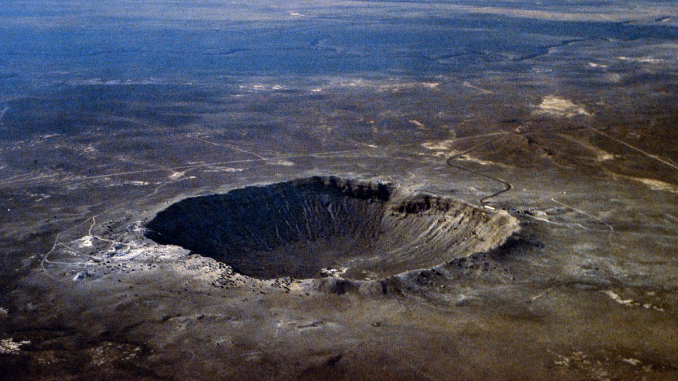
By Paul Angel
Out of times of unbridled chaos—manufactured by Mother Nature or Man himself—great things can often be accomplished. After all, as English novelist Mary Shelley remarked in 1818, “Invention, it must be humbly admitted, does not consist in creating out of a void, but out of chaos.”
Click the Link Below to Listen to the Audio of this Article
For instance, according to many historians, the impetus for the development of religion, astronomy, art, and the organization of civilization itself came not from diligent and uninterrupted effort, but was spurred by a massive cataclysm caused by numerous impacts of a disintegrating comet that hit North America in about 10,850 B.C.
This cosmic disaster resulted in the eradication of Clovis man and much of the mega- and microfauna of North America. Tsunamis of glacial meltwater tore over the landscape, gouging out the earth and tossing muti-ton boulders like pebbles, depositing them hundreds of miles away. The heat released from this event then lit much of North America on fire, as can be attested to by evidence in the geologic record. Eventually, the ash from this event diminished the sunlight, plunging the Earth into a new but relatively short-lived ice age.
But man was not defeated. Instead, he developed a keener interest in the stars, heavenly bodies, and the skies from which this planetary chaos was borne. This then developed into the building of sophisticated structures from which the ancients could monitor and track what was going on in the heavens.
Without this global chaos, man might never have pursued his focused study of the heavens, built great stone observatories, tracked these events on monuments in an attempt to somehow predict when something like this might happen again, or even developed religion, which was, most likely, an attempt to appeal to deities for their intercession so that such disasters might never happen again.
Much later, in A.D. 64, when more than 70% of Rome was burned to the ground, out of the chaos, Emperor Nero began an aggressive building campaign, transforming the city from embers to opulence.
Unfortunately, the huge expense of the rebuild caused societal chaos. The Christian religion, too, was threatened, with Nero ordering the persecution of Christians. Despite this chaos, Christianity eventually emerged as the dominant religion of the empire—and spread across the world.
As an aside, mass immigration, too, was one of the major causes of the eventual fall of Rome, as well as imperial insistence that Roman armies be spread out across the known world to subdue “barbarians,” causing vast tribes to rise up and resist. This military adventurism drained Rome’s coffers, but also created enemies on whatever shores Roman legions stepped foot. However, out of this chaos emerged what we today call Europe.
There are numerous other examples of humans emerging from chaotic periods that eventually evolved into better times. Take, for instance, the Bolshevik Revolution. From that period of mass chaos that accompanied the rise of Lenin and Trotsky through the era of Stalin, during which 40–60 million Christian Russians are estimated to have perished, came modern Russia, a developing superpower.
Out of the chaos of Mao Tse-Tung’s Cultural Revolution (30-60 million killed or starved during his time as dictator) has stepped modern China, a nation that can now place spacecraft on the Moon and fly missiles at hypersonic speeds.
In America’s own history, we, too have had chaotic dark ages. One of these recent eras lasted from approximately A.D. 2020–2024, when common sense was temporarily left languishing on death’s doorstep.
Starting with the death of African-American culture hero George Floyd on May 25, 2020, which spurred widespread mass unrest, arson, looting, murder, unbridled vandalism, through a successive period of widespread plague and pestilence, now known as the Covid-19 pandemic (early 2020 to mid-2023, when the “health emergency” was officially declared at an end), this age might be best described as the acme of political correctness and the nadir of American liberty.
During this bleak period of U.S. history, the public was subjected to an assault by elected and unelected bureaucrats demanding widespread censorship and the “cancellation” of those who dared speak out against official regime policies.
This kind of mass censorship had not been seen since the reigns of Abraham Lincoln (r. 1861–1865), who locked up anyone who publicly disagreed with his actions, and, later, Franklin Roosevelt (r. 1933–1945), who relentlessly persecuted critics of his interventionist policies, accusing them of treason and taking them to court to silence them via a mass sedition trial.
Those were trying times, but Joe Biden’s reign (r. 2021–2025) marked a tragic chapter in the American story. It might be called by future historians “the Dark Age of Joe,” a time when illogic, leftist propaganda and outright falsehoods overtook sanity. At the same time, freedom of speech, freedom of thought and freedom of religion ebbed to historic lows.
Luckily, King Biden’s reign only lasted four years but, in that short time, it transformed America, enshrining chaos as the new norm. Great monuments and statuary were torn down and destroyed, graves of formerly acknowledged American heroes were desecrated, confusion arose over the definitions of “man” and “woman,” public servants were forced to cover their faces with masks or lose their jobs, lawlessness went generally unpunished, and swathes of U.S. cities were occupied by criminals.
In addition, a new cult—“climate theology”—took hold of the minds of many.
This was an era of mass insanity in which Americans of all colors and creeds were purposefully pitted against one another by left-wing politicians to sow national chaos, so these “leaders” could retain their power.
Today, a would-be hero has emerged. His name is Donald Trump. He promises to bring order from chaos, to stop the alien hordes—invited in by the previous monarch—that have inundated our nation, caused strife and changed the complexion of the nation. He vows to end the costly and bloody wars that the U.S. empire has mired itself in for generations. He pledges to restore the law and order that has disappeared in many jurisdictions over the past half decade. He says that free speech and free thought will be ours again, the ailing health of the people can be reversed, and a new era of monumental building and national revitalization is here.
Twenty years ago, if I had suggested this real estate mogul and reality TV personality would be the savior we would all be counting on to usher America out of a period of great chaos into a new golden age, you would have laughed in my face. I probably would have chuckled, too.
But this is where we are today.
American poet James Russell Lowell once said, “A great man is made up of qualities that meet or make great occasions.”
We can only hope that Mr. Trump has the qualities—buried somewhere deep inside himself—to be the man we need now to meet this great occasion, to restore order from chaos, to work to solve the great problems this nation faces, and lead America to a new age of peace and prosperity.
Many have their doubts, but I hope time and history will prove us wrong. Everyone should be praying for his success—but expect a little chaos in the process.
Paul Angel is the Managing Editor of AFP.





